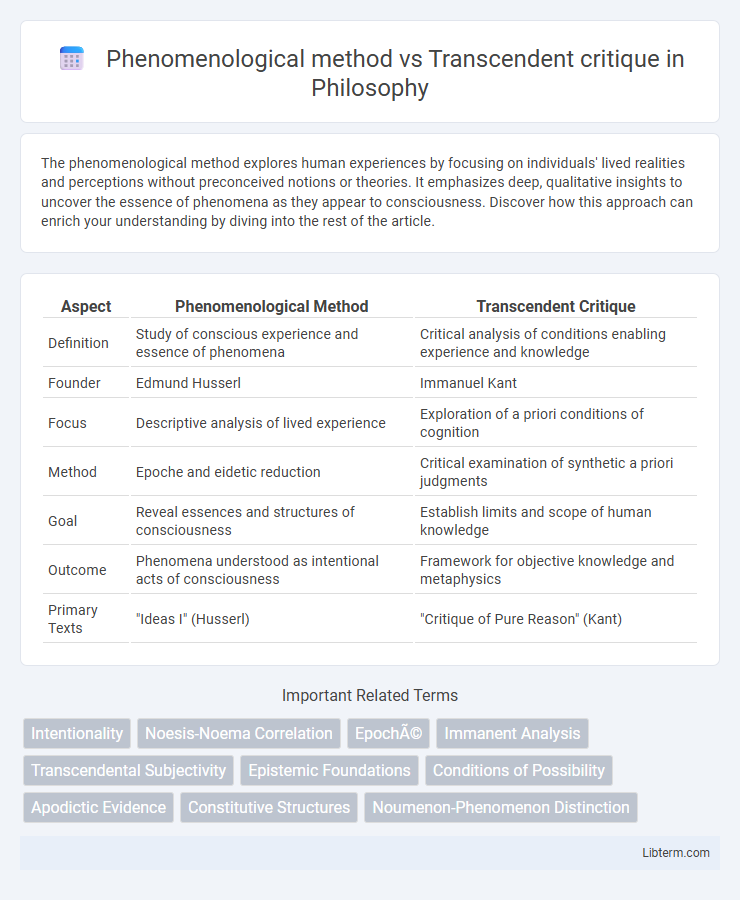The phenomenological method explores human experiences by focusing on individuals' lived realities and perceptions without preconceived notions or theories. It emphasizes deep, qualitative insights to uncover the essence of phenomena as they appear to consciousness. Discover how this approach can enrich your understanding by diving into the rest of the article.
Table of Comparison
| Aspect | Phenomenological Method | Transcendent Critique |
|---|---|---|
| Definition | Study of conscious experience and essence of phenomena | Critical analysis of conditions enabling experience and knowledge |
| Founder | Edmund Husserl | Immanuel Kant |
| Focus | Descriptive analysis of lived experience | Exploration of a priori conditions of cognition |
| Method | Epoche and eidetic reduction | Critical examination of synthetic a priori judgments |
| Goal | Reveal essences and structures of consciousness | Establish limits and scope of human knowledge |
| Outcome | Phenomena understood as intentional acts of consciousness | Framework for objective knowledge and metaphysics |
| Primary Texts | "Ideas I" (Husserl) | "Critique of Pure Reason" (Kant) |
Introduction to Phenomenological Method and Transcendent Critique
The phenomenological method involves the systematic exploration of lived experience to reveal the essence of phenomena by suspending judgments and focusing on conscious perception. In contrast, the transcendent critique, rooted in Kantian philosophy, examines the conditions of possibility for knowledge, emphasizing the limits and structures that govern human understanding beyond empirical experience. The introduction to the phenomenological method highlights its commitment to describing phenomena as they appear, whereas the transcendent critique introduces a framework for evaluating the a priori principles that underlie cognition and metaphysics.
Philosophical Foundations of Both Approaches
The phenomenological method centers on direct lived experience and intentionality, emphasizing the description of phenomena as they appear to consciousness, rooted in Husserl's concept of returning "to the things themselves." In contrast, transcendent critique, influenced by Kantian philosophy, investigates the conditions of possibility for knowledge and experience, focusing on the a priori structures that shape understanding beyond empirical data. Both approaches engage with consciousness but diverge philosophically: phenomenology prioritizes first-person perspective and epoche, while transcendent critique employs critical examination of cognitive faculties and transcendental arguments.
Key Concepts: Phenomenology Explained
Phenomenological method centers on the direct investigation of experience and consciousness, emphasizing intentionality, where consciousness is always about something, and epoche, the suspension of judgment to reveal phenomena as they appear. Transcendent critique, in contrast, involves a systematic questioning of the conditions of possibility for experience and knowledge, often tracing structures beyond immediate phenomena to uncover underlying transcendental principles. Key concepts in phenomenology include description without presuppositions, the reduction to essential essences, and the focus on lived experience as the foundation for understanding reality.
Key Concepts: Transcendent Critique Unpacked
The Transcendent Critique centers on examining the underlying assumptions and limits of human cognition by analyzing a priori conditions that shape experience, contrasting with the Phenomenological method which emphasizes direct description of lived experience without presuppositions. Key concepts in Transcendent Critique include the idea of transcendental conditions, synthetic a priori judgments, and the critical unveiling of how objects are constituted through cognitive frameworks beyond empirical observation. This approach reveals the interplay between subjectivity and objectivity, highlighting the boundaries of reason and the role of transcendental structures in shaping knowledge.
Methodological Differences Between the Two
The phenomenological method emphasizes the direct examination of lived experiences through intentional consciousness, using techniques such as epoche and reduction to suspend biases. Transcendental critique, rooted in Kantian philosophy, analyzes the a priori conditions that make knowledge possible, focusing on the limits and structures of cognition rather than empirical experience. Methodologically, phenomenology prioritizes descriptive analysis of subjective experience, while transcendental critique engages in normative evaluation of the foundational principles underlying knowledge acquisition.
Epistemological Assumptions Compared
Phenomenological method centers on direct experience and the intentional structures of consciousness, emphasizing how knowledge arises through lived phenomena without presuppositions. Transcendent critique, rooted in Kantian philosophy, examines the conditions that make knowledge possible, focusing on universal and necessary epistemological frameworks beyond empirical experience. While phenomenology assumes knowledge is grounded in subjective perception, transcendent critique presupposes that objective cognition depends on aprioristic structures shaping human understanding.
Applications in Contemporary Philosophy
The phenomenological method emphasizes direct investigation of conscious experience, widely applied in existentialism, psychology, and cognitive science to explore subjective reality and intentionality. Transcendent critique, rooted in Kantian philosophy, analyzes the conditions of possibility for knowledge, shaping debates in epistemology, metaphysics, and critical theory. Contemporary philosophy utilizes phenomenology for embodied cognition studies while employing transcendent critique to challenge assumptions in science and ethics, fostering interdisciplinary dialogue.
Major Thinkers: Husserl versus Kant
Edmund Husserl's phenomenological method emphasizes the direct investigation of conscious experience through intentionality and epoche, seeking to reveal the essential structures of phenomena as they appear. Immanuel Kant's transcendent critique centers on the conditions of possibility for knowledge, proposing that the mind actively shapes experience through a priori categories and forms of intuition. Husserl extends Kant's insights by focusing on the lived experience itself rather than the conditions behind cognition, marking a shift from transcendental idealism to transcendental phenomenology.
Strengths and Limitations of Each Method
The phenomenological method excels in capturing subjective experience and consciousness, providing rich, detailed insights into human perception but faces limitations in generalizability and potential researcher bias. Transcendent critique offers a systematic framework for examining underlying assumptions and ideological structures, strengthening critical awareness, yet it can be abstract and challenging to apply concretely in empirical research. While phenomenology emphasizes lived experience, transcendent critique prioritizes structural analysis, making each method suitable for different research goals but less effective when used in isolation.
Conclusion: Towards a Synthesis or Distinction
The phenomenological method emphasizes direct exploration of lived experience to reveal essences, while transcendent critique interrogates conditions underlying knowledge and existence beyond immediate perception. Synthesizing both approaches offers a comprehensive framework that integrates subjective consciousness with objective critique, enriching philosophical inquiry. Distinguishing them clarifies their unique contributions: phenomenology centers on intentionality and perception, whereas transcendent critique challenges and deconstructs foundational assumptions.
Phenomenological method Infographic

 libterm.com
libterm.com